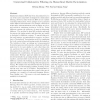Free Online Productivity Tools
i2Speak
i2Symbol
i2OCR
iTex2Img
iWeb2Print
iWeb2Shot
i2Type
iPdf2Split
iPdf2Merge
i2Bopomofo
i2Arabic
i2Style
i2Image
i2PDF
iLatex2Rtf
Sci2ools
159
click to vote
SDM
2012
SIAM
2012
SIAM
Contextual Collaborative Filtering via Hierarchical Matrix Factorization
Matrix factorization (MF) has been demonstrated to be one of the most competitive techniques for collaborative filtering. However, state-of-the-art MFs do not consider contextual information, where ratings can be generated under different environments. For example, users select items under various situations, such as happy mood vs. sad, mobile vs. stationary, movies vs. book, etc. Under different contexts, the preference of users are inherently different. The problem is that MF methods uniformly decompose the rating matrix, and thus they are unable to factorize for different contexts. To amend this problem and improve recommendation accuracy, we introduce a “hierarchical” factorization model by considering the local context when performing matrix factorization. The intuition is that: as ratings are being generated from heterogeneous environments, certain user and item pairs tend to be more similar to each other than others, and hence they ought to receive more collaborative i...
Related Content
| Added | 29 Sep 2012 |
| Updated | 29 Sep 2012 |
| Type | Journal |
| Year | 2012 |
| Where | SDM |
| Authors | ErHeng Zhong, Wei Fan, Qiang Yang |
Comments (0)

